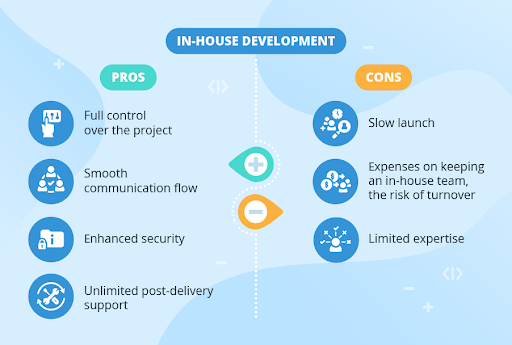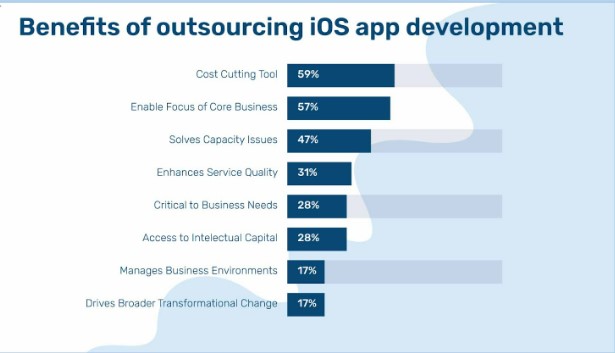In-House vs. Outsourced: Which is Better for Hiring iOS Developers?
- Visruth Devadas
- July 24, 2024
- 5 Minute Read

Any company engaged in developing or outsourcing mobile app development must make a major strategic decision about whether to hire iOS developers in-house or contract with outside agencies or freelancers. This decision can impact a project’s overall success and compatibility with long-term corporate goals.
Each hiring strategy has its unique advantages and limitations. In-house recruiting enables direct control over the development process and strong integration of developers with a company’s culture and goals. On the other hand, outsourcing can offer expertise at a lower cost, particularly when specialized knowledge is not readily available within the company. According to Statista, spending on IT outsourcing services was estimated to reach $1.2 trillion globally in 2022.
The quality of the development staff directly impacts the dependability and functionality of the produced application. Hiring a well-selected iOS developer can result in the development of creative, market-leading apps with outstanding user experiences and dependability. On the other hand, a poorly put-together team could produce delayed releases or programs that fall short of the anticipated requirements.
In this article, we will compare outsourced vs. in-house iOS app development and explore which approach is better for you to hire iOS developers.
Understanding In-House Hiring of iOS developer

In-house recruiting is the practice of hiring individuals directly under the company’s payroll to operate within its structure. Usually, the need for new staff initiates this process when the company launches new initiatives or needs more assistance for ongoing projects.
Following their employment, the business integrates these staff members through an onboarding program and the required training.
Key Benefits of In-House Teams
In-house hiring provides the following key benefits:
- Control and Coordination: Having an internal team allows for easier task coordination and more control over projects. Managers can make real-time choices, directly supervise development initiatives, and carry out modifications without the delays associated with outside teams.
- Alignment with Company Culture: Employees who operate in an organizational setting are more likely to grasp and live the corporate culture, strengthening teamwork and raising output.
- Long-Term Development: In-house teams can expand and change with the business, gathering institutional expertise that can be applied to future projects and improving efficiency and creativity over time.
Common Challenges of Maintaining an In-House Team
In-house hiring can also raise the following challenges:
- High Costs: Maintaining an in-house workforce entails paying for benefits, training, office space, and technology, among other expenses beyond wages. Particularly in areas with higher labor costs, these expenses can be greater than those of outsourcing.
- Scalability Issues: Hiring new employees can be a resource-intensive process, and during harder times, the business may discover that it has extra people without clear assignments.
- Skill Gaps: Maintaining the abilities of in-house staff requires ongoing education and growth. This continuous requirement to upgrade skills can be expensive and demanding; local recruitment of highly trained workers may also be difficult.
Exploring Outsourced Hiring of iOS developer

Outsourced hiring is the practice of engaging an outside company or freelancers to handle specific projects or tasks rather than full-time in-house workers.
In sectors like software development, where the demand for adaptability and specialized knowledge is strong, this strategy is especially common.
Key Benefits of Outsourcing
Outsourcing provides the following benefits:
- Cost Management: Outsourcing mobile app development can greatly lower overhead connected to infrastructure, training, and hiring.
- Scalability and Flexibility: It lets resources be quickly scaled to fit project requirements, therefore offering flexibility free from the long-term commitments connected with full-time staff.
- Access to Specialized Expertise: Outsourcing allows businesses to access a worldwide talent pool, providing specific skills and more general viewpoints that could be difficult to find locally.
Common Challenges of Outsourcing
Outsourcing can have the following associated challenges:
- Quality and Oversight Issues: Managing quality can be challenging without direct control; hence, strong contractual agreements and open lines of communication are necessary to guarantee project specifications are satisfied.
- Communication and Cultural Differences: Outsourcing can cause difficulties, such as language barriers, cultural variations, and time zone variances, resulting in misunderstandings and possibly project delays.
- Security and Confidentiality Risks: Sharing private information with outside vendors raises businesses’ risk of data breaches and intellectual property theft, which requires strict security policies.
Cost Considerations of Hiring in-house vs outsourced iOS developer
Financial factors are quite important when choosing to hire iOS developers. In-house hiring involves direct and indirect expenses, including pay, benefits, training, and infrastructure. In areas with significant labor expenditures, these charges are sometimes higher. In such cases, outsourcing could seem reasonably affordable because of lower initial rates and fewer overhead expenses.
In the case of outsourcing mobile app development, you must also consider hidden expenses such as contract management, possible quality corrections, and intellectual property maintenance to properly estimate your predicted savings.
Both approaches have very different long-term financial consequences. Although they may have greater initial expenses, in-house teams can, over time, create more value through consistent contributions to corporate goals and lower turnover. Although outsourcing may be less expensive initially, it could result in increased expenses associated with the transition and management of outside employees.
Considering the short-term and long-term expenses for both alternatives will help you plan your budget and effectively manage your resources.
Quality and Control
The success of iOS development initiatives depends critically on measurements of quality and control. Through direct control made possible by in-house teams, companies can produce goods that are in line with their goals and standards. This approach encourages regular communication and quick decision-making, which frequently produces goods that satisfy the initial project needs.
Outsourced initiatives need strong management to guarantee alignment with corporate goals, even though they can generate excellent outputs. Unless controlled by solid contractual agreements and efficient communication tactics, the lack of direct control might result in difficulties in preserving constant quality. Outsourcing requires consistent checks and well-defined expectations to match the standards of the business with those of external resources.
Flexibility and Scalability
Dynamic technology environments significantly appreciate scalability and flexibility. In-house development lets businesses pivot quickly in response to new prospects or obstacles while nevertheless offering stability and a close connection with business operations. However, since it usually entails hiring and training new workers or upskilling existing ones, increasing in-house skills may be costly and slow.
Businesses can more dynamically adjust resource levels to meet project requirements thanks to outsourcing’s excellent scalability. It lets you quickly scale up or down, free from the long-term obligations of growing an internal staff. This methodology is especially beneficial when venturing into new technological domains that require specialized knowledge.
Security and Confidentiality
In-house development usually offers better security because all facets of development are internal, reducing the vulnerability to outside hazards and intellectual property leakage.
Outsourcing necessitates strict security policies to reduce the risks associated with the external management of business data. Establishing solid data security agreements, screening suppliers for conformity with international security criteria, and routinely reviewing their operations to guarantee data integrity are all part of this. Despite the risks associated with outsourcing, they can be managed through effective design and security systems.
Conclusion
The decision between in-house and outsource mobile app development depends on a thorough evaluation of each method’s advantages and constraints with respect to your particular company’s demands, project requirements, and strategic goals. Although internal development gives more control and is better suited to business culture, outsourcing can provide major benefits in terms of cost-effectiveness, adaptability, and the availability of specialist knowledge.
A hybrid strategy, which combines in-house and outsourcing advantages, can sometimes offer the best of both worlds, enabling flexibility in project management and resource allocation.

Thank you for submitting the details!
We will keep your information safe. Feel free to contact us with any questions at hello@uplers.com
Please check your email for next steps shared by Robert.

















